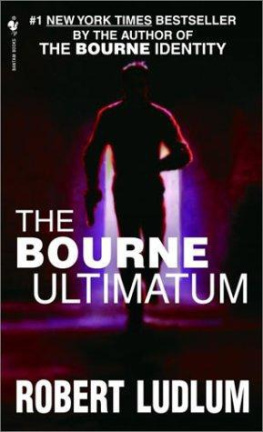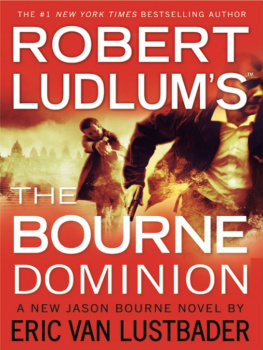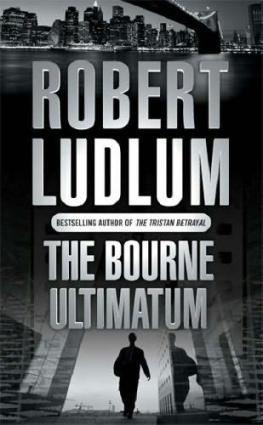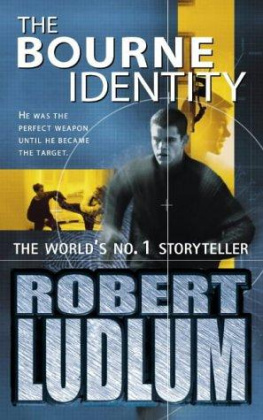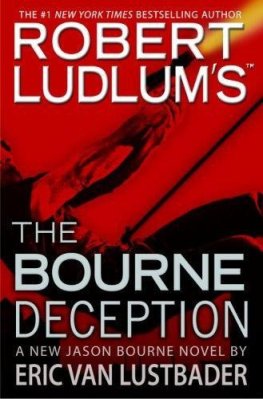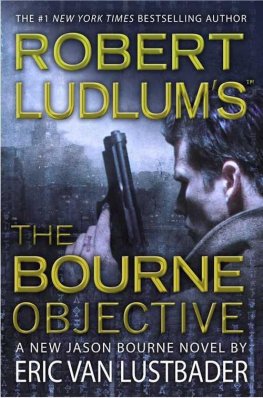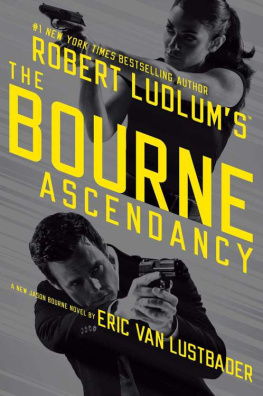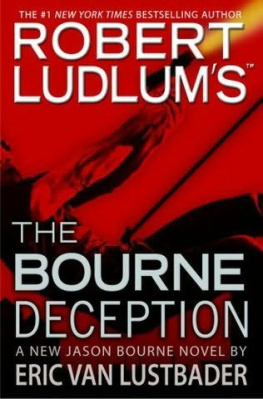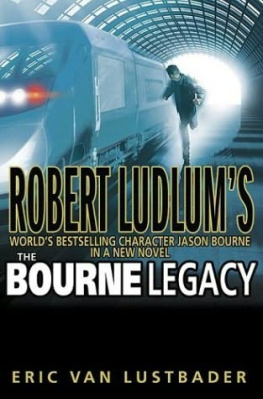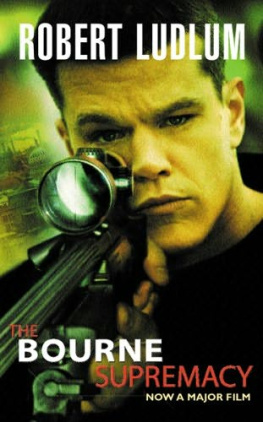-- Scratch Scan 02 07 01-
The Bourne Supremacy
Robert Ludlum, a US Marine in the Second World War, was born in New York City, raised in Short Hills, New Jersey and educated in Connecticut.
A former actor and theatrical producer, at forty he decided to change careers and try his hand at writing. The rest is history - a reputation for immediate bestsellers, publication in 40 countries and 32 languages, and sales of 200 million copies worldwide.
Robert Ludlum lives in Florida with his wife Mary, a former actress and his first critic. They have three children.
BY THE SAME AUTHOR
The Scarlatti Inheritance The Osterman Weekend
The Matlock Paper The Rhinemann Exchange
The Gemini Contenders
The Chancellor Manuscript
The Holcroft Covenant
The Bourne Identity
The Matarese Circle
The Road to Gandolfo
The Parsifal Mosaic
The Aquitaine Progression
The Icarus Agenda
Trevayne
The Bourne Ultimatum
The Road to Omaha
The Scorpio Illusion
The Apocalypse Watch
ROBERT LUDLUM
THE BOURNE SUPREMACY
Harper Collins Publishers
77-85 Fulham Palace Road,
Hammersmith, London W6 8JB
This paperback edition 1994 3579864
Previously published in paperback by Grafton 1987 Reprinted eight times
First published in Great Britain by GraftonBooks 1986
Copyright (c) Robert Ludlum 1986
The Author asserts the moral right to be identified as the author of this work
ISBN 0586 064540 Set in Times
For Shannon Paige Ludlum
Welcome, my dear.
Have a great life.
Printed in Great Britain by Harper Collins Manufacturing Glasgow
All rights reserved. No part of this publication may be reproduced, stored in a retrieval system, or transmitted,
in any form or by any means, electronic, mechanical,
photocopying, recording or otherwise, without the prior
permission of the publishers.
This book is sold subject to the condition that it shall not, by way of trade or otherwise, be lent, re-sold, hired out or otherwise circulated without the publisher's prior consent in any form of binding or cover other than that in which it is published and without a similar condition including this condition being imposed on the subsequent purchaser.
1
Kowloon. The teeming final extension of China that is no part of the north except in spirit - but the spirit runs deep and descends into the caverns of men's souls without regard for the harsh, irrelevant practicalities of political borders. The land and the water are one, and it is the will of the spirit that determines how man will use the land and the water - again without regard for such abstractions as useless freedom or escapable confinement. The concern is only with empty stomachs, with women's stomachs, children's stomachs. Survival. There is nothing else. All the rest is dung to be spread over the infertile fields.
It was sundown, and both in Kowloon and across Victoria Harbour on the island of Hong Kong an unseen blanket was gradually being lowered over the territory's daylight chaos. The screeching Aiyas! of the street merchants were muted with the shadows, and quiet negotiations in the upper regions of the cold, majestic structures of glass and steel that marked the colony's skyline were ending with nods and shrugs and brief smiles of silent accommodation. Night was coming, proclaimed by a blinding orange sun piercing an immense, jagged fragmented wall of clouds in the west - sharply defined shafts of uncompromising energy about to plunge over the horizon, unwilling to let this part of the world forget the light.
Soon darkness would spread across the sky, but not below.
Below, the blazing lights of human invention would garishly illuminate the earth - this part of the earth where the land and the water were anxious avenues of access and conflict. And with the never-ending, ever-strident nocturnal carnival, other games would begin, games the human race should have abandoned with the first light of creation. But there was no human life then - so who recorded it? Who knew? Who cared? Death was not a commodity.
A small motorboat, its powerful engine belying its shabby exterior, sped through the Lamma Channel, heading around the coastline towards the harbour. To a disinterested observer it was merely one more xiao wan ju, a legacy to a first son from a once unworthy fisherman who had struck minor riches - a crazy night of mah-jong, hashish from the Triangle, smuggled jewels out of Macao - who cared? The son could cast his nets or run his merchandise more efficiently by using a fast propeller rather than the slow sail of a junk or the sluggish engine of a sampan. Even the Chinese border guards and the marine patrols on and off the shores of the Shenzhen Wan did not fire on such insignificant transgressors; they were unimportant and who knew what families beyond the New Territories on the Mainland might benefit. It could be one of their own. The sweet herbs from the hills still brought full stomachs - perhaps filling one of their own. Who cared? Let them come. Let them go.
The small craft with its canvas cover enveloping both sides of the forward cockpit cut its speed and cautiously zigzagged through the scattered flotilla of junks and sampans returning to their crowded berths in Aberdeen. One after another the boat people shrieked angry curses at the intruder, at its impudent engine and its more impudent wake. Then each became strangely silent as the rude interloper passed; something under the canvas quieted their sudden bursts of fury.
The boat raced into the harbour's corridor, a dark, watery path now bordered by the blazing lights of the island of Hong Kong on the right, Kowloon on the left. Three minutes later the outboard motor sank into its lowest register as the hull swerved slowly past two filthy barges docked at the godown, and slid into an empty space on the west side of the Tsim Sha Tsui, Kowloon's crowded, dollar-conscious waterfront. The strident hordes of merchants setting up their nightly tourist traps on the wharf paid no attention; it was merely one more jigi coming in from the catch. Who cared?
Then, like the boat people out in the channel, the stalls on the waterfront nearest the insignificant intruder began to quiet down. Excited voices were silenced amid screeching commands and counter-commands as eyes were drawn to a figure climbing up the black, oil-soaked ladder to the pier.
He was a holy man. His shrouded figure was draped in a pure white caftan that accentuated his tall slender body - very tall for a Zhongguo ren, nearly six feet in height, perhaps. Little could be seen of his face, however, as the cloth was loose and the breezes kept pressing the white fabric across his dark features, drawing out the whiteness of his eyes determined eyes, zealous eyes. This was no ordinary priest, anyone could see that. He was a heshang, a chosen one selected by elders steeped in wisdom who could perceive the inner spiritual knowledge of a young monk destined for higher things. And it did not hurt that such a monk was tall and slender and had eyes of fire. Such holy men drew attention to themselves, to their personages to their eyes and generous contributions followed, both in fear and in awe; mostly fear. Perhaps this heshang came from one of the mystic sects that wandered through the hills and forests of the Guangze, or from a religious brotherhood in the mountains of far-off Qing Gaoyuan - descendants, it was said, of a people in the distant Himalayas - they were always quite ostentatious and generally to be feared the most, for few understood their obscure teachings. Teachings that were couched in gentleness, but with subtle hints of indescribable agony should their lessons go unheeded. There was too much agony on the land and the water. Who needed more? So give to the spirits, to the eyes of fire. Perhaps it would be recorded somewhere.
Next page

